Stay in the know on all smart updates of your favorite topics.
Unravelau
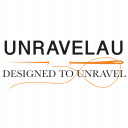
Unravelau is a high-end fashion brand established in 2017 by the designer Laura Meijering who believes that you don’t have to sacrifice style in order to make conscious choices. While each collection is unique, they are all designed with care for the planet. Our garments are handcrafted in The Netherlands and made of natural and upcycled materials only. At Unravelau, we believe that every little step counts - together with you, we unravel the fashion industry. One garment at a time.
Solar Decathlon Europe
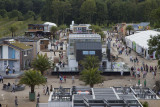
The Call for Cities for the Solar Decathlon Europe 2023 has been published. This would be a huge opportunity for Amsterdam to host this event to raise energy literacy.
Seenons
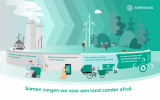
Samen maken wij 100.000 bedrijven restafval-vrij in 2025!
Seenons maakt het omschakelen naar een duurzame bedrijfsvoering gemakkelijk.
Seenons bundelt de krachten van traditionele afvaldienstverleners en duurzame logistieke partijen in een intelligent platform. Jij geeft aan welke specifieke afvalstromen er vrij komen bij jou in het bedrijf. Wij kijken welke partij bij jou in de buurt is en halen het afval op de meest duurzame manier op. Dit gebeurt allemaal contract vrij en is optimaal flexibel opgesteld. Geen vaste dagen met betrekking tot het ophalen. Simpelweg: bak vol? Geef het door, wij regelen de rest!
Op de hoogte blijven van ontwikkelingen of meer informatie?
Stuur een mailtje naar <hallo@seenons.com>
EC-Link Platform

You would like to connect with Urban Environmental Sustainability practitioners and researchers in China and exchange your approaches to green transport, clean energy, compact urban development, water and solid waste management, green buildings and municipal finance? Then sign up to the EC-Link platform! The platform links Eco Cities across Europe and China, offering inspiring examples from both sides of Eurasia and enabling direct contacts to the innovators. With the help of an integrated translation tool, posts can be translated into Chinese and English with just one click. Use of the platform is free of charge: http://eclink.org/bbs/#/?lang=en
A description of how the platform works can be downloaded here: http://eclink.org/ec_platform/upload/document/EC-Link_Users'%20Guide-EN.pdf
Parksharing: for local collaboration and sharing between businesses

The importance of working together locally, sharing together, and matching supply and demand between companies is increasing. More than ever, we see local entrepreneurs helping each other and purchasing products or services from one another. Working together from the catering industry to healthcare pays off. Parksharing enables entrepreneurs, businesses and organizations to take concrete steps towards local cooperation and sustainable entrepreneurship.
Connecting, collaborating and sustainability
We connect companies and organizations at local level through Parksharing. The platform shows which companies and organizations are in the municipality and what they can do for each other. Companies can then offer and purchase their products and services among themselves. After all, why find a distant friend when you have a good neighbor?
In addition, companies can match and share the supply and demand of company resources, materials, residual flows, services, personnel and facilities. For some companies, there is a great demand for materials, resources or extra manpower, while for other organizations equipment is idle or staff are temporarily available.
Think very concretely about: forklift trucks, storage space, parking spaces, partial mobility, residual flows and materials, transport capacity, meeting rooms, surplus stock, knowledge, sustainable projects or business cases, workplaces, technical staff and warehouse employees, for example.
PARKSHARING FOR LOCAL COLLABORATION AND SHARING
The importance of working together locally, sharing together, and matching supply and demand between companies is increasing. More than ever, we see local entrepreneurs helping each other and purchasing products or services from one another. Working together from the catering industry to healthcare pays off. Park sharing enables entrepreneurs, companies and organizations to take concrete steps towards local cooperation and sustainable entrepreneurship.
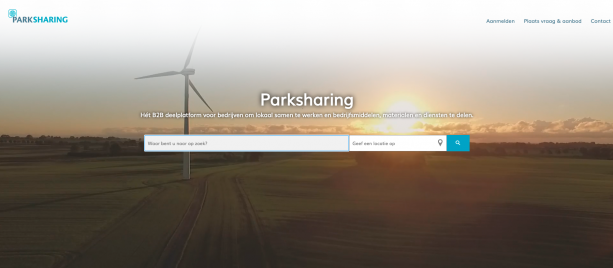
CONNECT, COLLABORATE, SHARE AND BECOME SUSTAINABLE
We connect companies and organizations at local level through Parksharing. The platform shows which companies and organizations are in the municipality and what they can do for each other. Companies can then offer and purchase their products and services among themselves. After all, why find a distant friend when you have a good neighbor?
In addition, companies can match and share the supply and demand of company resources, materials, residual flows, services, personnel and facilities. For some companies, there is a great demand for materials, resources or extra manpower, while for other organizations equipment is idle or staff are temporarily available.
Think very concretely about: forklift trucks, storage space, parking spaces, partial mobility, residual flows and materials, transport capacity, meeting rooms, surplus stock, knowledge, sustainable projects or business cases, workplaces, technical staff and warehouse employees, for example.
PARKSHARING SCAN
To accelerate this new and circular development from ownership to use, we have developed a ParkSharingScan. This allows companies to calculate in advance what they can potentially earn and save by sharing assets, materials, services and facilities, both in euros and in energy and CO2.
The first results of the SharingScan are already promising: 10.3 million euros potential savings in costs, 7.5 million CO2 savings and more than 11.5 million KwH in energy savings.
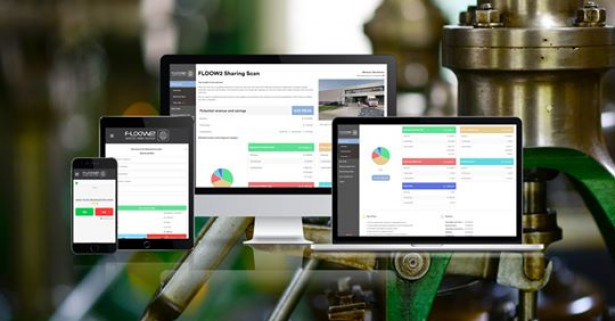
Schijnerg Group

Creating the next-generation renewable energy digital platform, focusing on machine learning-based consulting and sustainable community. Additionally, it provides engineering consultancy which is 100% digital through machine learning optimization. Furthermore, it also transforms the data to solve unique to our client need and it embarks a lifelong companion for clients to grow from installation to decommissioning.
Bees Digital Farm

Ever since the 20th century most of the countries across the globe are still using the traditional way of farming and it’s still going on for the demand and supply of people. As we all know that by the year 2050, the 80 % estimation of the world population will have been living in urban areas which can lead the total population of the world to increase by 3 billion people. With this large amount of increase in population, scientists and researchers are quite worried about the farmland which will be required to generate such a huge demand for food supply to fulfill the necessity to survive. Noticing this fact in mind as what would be the future source of alternative solutions to solve such a type of problem a concept was proposed named “In-House Farming”.
Developing Pilot Project in Petaling Jaya, Malaysia
Looking for the experts behind Circle Scan, Amsterdam on mappin material flows in the city. Applying the “Circle Scan” methodology meant identifying the top contributing sectors in terms of environmental and economic impact and mapping the material flows of such sectors in the city. That is, organizing the information about the inputs used (energy, water, etc) and the outputs generated (types of waste, where they end up, etc). These mapping exercise allows for a clear understanding of where resources come from and where waste goes to, which actors in specific sectors are key and whether there are empty spaces that can be utilized differently, providing solutions to create closed loops
Email me at <lilacjade@gmail.com> or <jacqueline@mosti.gov.my>
Johnny Cashew
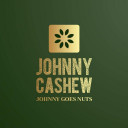
Be a superhero! Our cashew travel 12.500 km less than the cashew you will find in your local supermarket and they are better for the farmer, the environment and you.
Did you know that 90% of all cashew nuts travel 27.000 km before they end up at a store near you (3/4 the glove)? Did you know that Africa is the world largest producer, but that 90% of the nuts are being processed in Vietnam & India under harsh conditions, only to be shipped all the way back to the Netherlands?
Neither did we...
But as soon as we realized this, we started this project: Johnny Cashew. We decided to ship cashew straight from Tanzania, while making sure the farmer and the local processor got a fair price. Also, we found a home for the broken cashew nuts that are normally cast aside: we started workshops in Amsterdam to turn them into bars, pasta and maybe also a dressing on your next ice cream :).
Part of our profits will go to planting new cashew trees in Tanzania: good for the farmer, the environment and your karma.
In other words: our nuts taste good, look good and do good!
More info at www.JohnnyCashew.com
Circular Economy Course - UvA

PPLE at the University of Amsterdam is an intense interdisciplinary program for bright bachelor’s students. Within this faculty, international (including Dutch) students are brought together and posed with challenging courses designed to help them think critically about society and the world around them. These dedicated driven students typically have strong backgrounds in social sciences, however, lack education in the area of sustainability. TheRockGroup sees it as its mission to fill this gap by presenting practical societal perspectives on our current sustainability challenges.
The courses invited guest speakers from relevant societal actors (businesses, government and/or NGO’s) to provide real-life examples to students. This brought the studied theory and our class debates to a higher level. Not only did it show the relevance of what we studied, it also portrayed the complexity of current challenges in a world without perfection information.
Circulaire Houtketens

Om te kijken hoe hout opnieuw en duurzaam gebruikt kan worden, zijn de provincie en Dr2 New Economy gestart met een aantal pilots waarin lokaal en gebruikt hout wordt toegepast in de bouw. Zo zijn 1.200 balken uit de busremise in Zaandam gesloopt en hergebruikt voor een nieuwe toepassing in de bouw.
Via een tweede pilot wordt gekeken hoe resthout als snoei-, tak-, top- en stamhout uit plantsoenen en parken van de stad, in de bouw hergebruikt kan worden. Bijvoorbeeld in de vorm van balken, planken of plaatmateriaal. Hout is een bekend en prachtig bouwmateriaal. Bij productie en verwerking is de CO2-uitstoot veel lager dan die van staal of beton. In het hout is juist veel CO2 vastgelegd, waarmee de woningen zorgen voor langdurige CO2 opslag.
Permaculture Impact on Schools, Europa School Transformation
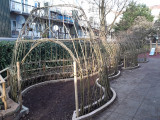
Our children are growing on paved, 2 dimentional and disconnected school environments. We are here to change that. With our passion Permaculture concept, we designed and created a new style of school garden, which doesn't exist in Amsterdam and if we are not wrong in the Netherlands. It was not the first of our school design/implementation. Laterna Magica School in IJburg Amsterdam is also another example.
You can find further info, photos, videos on our website. We need help from all aware people to inform schools about our services that we can have more impact on our environment and children's connection with nature
CEDaCI – Circular Economy for the Data Center Industry

The Data Centre Industry has grown rapidly and generates a large volume of e-waste / WEEE. The current infrastructure for dealing with this waste is underdeveloped and consequently, there is a real and urgent need to address this now. CEDaCI will build a Circular Economy for the Data Centre Industry by bringing together stakeholders from all equipment life cycle stages to turn this waste into a useful resource and support the ongoing rapid growth of the DCI.
KASKANTINE 4.0

The Kaskantine will implement together with the neighboorhood its design for closing local resource loops: a kitchen with closed water cycle, preventing local food waste, introduce neighbourhood composting, and organise repair cafe's, sport and musique workshops, etc. Data will be gathered to monitor the resource cycling and methods will be tested to make it more socially and culturally inclusive.
User-created nature-based solutions in an urban environment;
The case of the KasKantine (Greenhouse Cantina), Amsterdam
Historically landscape architecture and infrastructural planning have assigned physical separated functions to landscape in order to upscale and manage resource flows cost efficiently. Rather than monosectoral and large scale linear production systems we can now see a shift to decentralized and locally integrated solutions to close resource loops. In these solutions also citizens can play a more (pro)active role. After being more prominent in rural areas, landscape architecture is now also more active as a lead design principle in urban neighbourhoods. Local integrated solutions for resource cycling efficiency give rise to multiple value production rather than to an increase of local financial income. Either way it increases citizen driven (semi)professional activities in resource management in urban neighbourhoods, as well in its creation and in management.
We see enormous potential in this approach: it can reconnect citizens to nature, it can facilitate in changing lifestyles AND produce the right technology to face our climate and resource crisis. But before it can become mainstream, we see the following challenges and questions, mainly to do with creating sufficient local political support and accessibility to these technological and economic opportunities.
- How can actors on local level on one side and central sectoral level at the other side co-create and redesign effectively the landscape, necessary to close resource loops locally with sufficient democratic legitimacy?
- How could citizen-driven services in resource management be held accountable to a broader public and the public sector?
- How can these nature-based solutions be culturally and socially inclusive?
- How can socio-economically marginal(ized|) groups profit from this increased multiple-values production?
We can try to answer those questions for one specific case to see how it could work out in practice. The Kaskantine is a not-for-profit volunteer driven garden- restaurant - food coop which has as its main objective to show that more autonomous, off the grid nature based solutions for climate adaptive working and living in urban areas are possible and can be at the same time a new lifestyle. It is a small village of refurbished shipping containers, recycled greenhouses and (roof top)gardens. The Kaskantine is currently being built on its fourth location and is negotiating a 7 years ground lease with the municipality of Amsterdam.
The Kaskantine managed to grow from only one container and a one-man company, 5 years ago, to a cooperative with over 30 volunteers with 13 containers. A second village is being planned of 7 containers in the east of Amsterdam. This has been realised without any external capital investment or subsidies. The strategy has always been: find a solution with the least possible financial costs and turn untapped local resources into value.
In doing so the Kaskantine discovered that although real estate prices in Amsterdam skyrocket, there is still a lot of underutilised land and water, that is without use for people and for nature. Lots of plots are “waiting” to be developed, or are underdeveloped: for one function while there could be double or triple functionalities. We could call this “real estate waste”. The Kaskantine could use land for free because there was no direct market value of that land. And the same counts for other important resources: (rain)water, (solar)energy, food (waste and own production), labour (volunteers) and (natural and waste) materials. The Kaskantine is able to operate with zero fixed costs and therefore able to survive.
Furthermore, with its installations it is trying to integrate all received good and services in local loops. Maximum in, minimum out. This is optimized by integrating different resource loops in one management system.
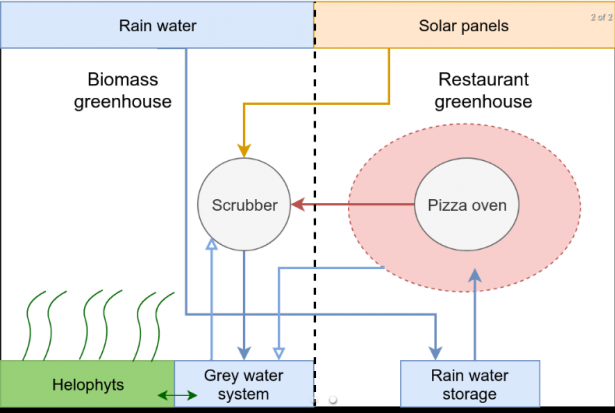
An abundance of one flow of resources can be absorbed by other resource cycles: Peak solar energy can be used in extra ventilation, aeration and irrigation. Sudden food surpluses are redistributed for free and create network solidarity. The Kaskantine is also able to use resources in all phases of their life cycle, like wood: from construction to fire wood. Or being able by using rest heat in storing it in mass or other spaces, or filtering waste water for irrigation. We call this adaptive capacity: the capacity to buffer abundance and use it later or in an alternative way.
Finally, an alternative lifestyle is embraced, one that is appreciating the value of abundance of local resources, rather than the value of market choice.
We could argue that the Kaskantine is thriving in an alternative economy, that can exist thanks to and despite of the mainstream economy that they are trying to transform. We call this abundance or give economy, in contrast with economy based on consumption and the organisation of scarcity.
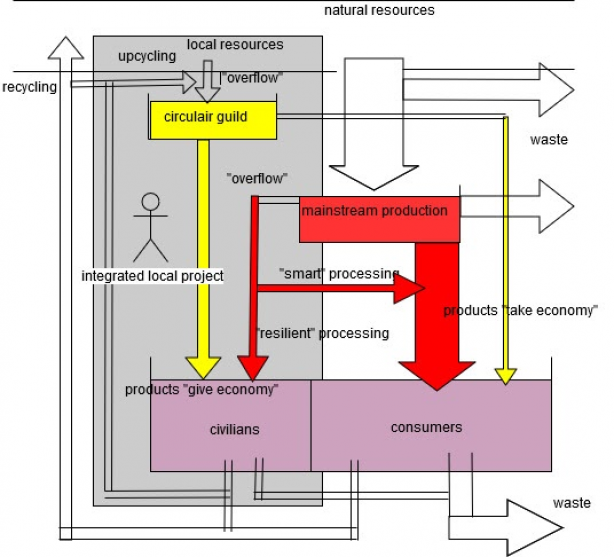
Abundance economy as being a sum of relatively autonomous integrated projects in mainstream economy.
Because of its ability to expand autonomously within mainstream economy, and because its abundance economy is not a zero-sum game as long as local resources and waste are underutilised, the Kaskantine is very open for participation. There is no economic argument against including more neighborhood activities, on the contrary. More participation seems therefore to depend more on the capability of cultural inclusiveness: if people feel comfortable within the network of the Kaskantine, or if people feel comfortable to start a sort of “kaskantine” on their own.
First, the opportunity to integrate has been ”built in” into the design of the Kaskantine by a step-in approach. From experience as a guest (exchange, tasting, get inspired, etc) to participation in the design, creation and operation of the Kaskantine and Kaskantine related projects.
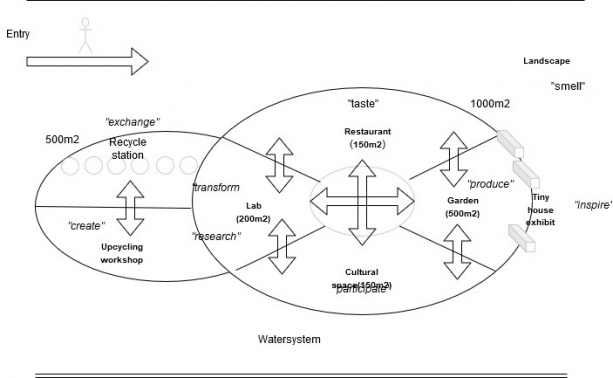
Secondly, the Kaskantine is also active in the neighbourhood centre and within a network of community organisations, with a step-out approach. In this case the Kaskantine offers through free workshops a learning curve to adopt small scale installations, like vertical gardens and worm composting, and participate in food saving and storage at home in order to take a step back from mainstream economy into the abundance economy.
An important ambition of the Kaskantine is to negotiate with the municipality a land lease contract in which the landuser takes responsibility for its development and environmental control of the land. This cheaper land rent will hopefully give other “kaskantines” the opportunity to arise.
The Kaskantine has free energy to spend on helping other groups in joining this movement because it can operate autonomously and with low fixed costs. This creates hopeful opportunities for inclusiveness of the proposed solutions. Whether this is done in some kind of co-creation with more central institutions depends more on their own capability to work with local small scale initiatives and on their willingness to change or compensate the negative effects of their lineair production models and on their willingness and capability to change sectoral into integrated policies.
YIMBY Yes-In-My-Back-Yard Amsterdam!
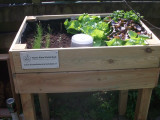
The grassroots movement YIMBY Yes-In-My-Back-Yard! stimulates local food growing in the city. The so called YIMBY food growing containers are the first food growing experience for citizen. Together with green lessons citizen will grow in local food growing in the city. At the national neighbour day a yearly green event is organized to exchange green ideas and good food.
Arnhem - Het Arnhemse burgerinitiatief YIMBY, Yes-In-My-Back-Yard Arnhem! is genomineerd voor de duurzame Top 100 van het dagblad Trouw. De elfde editie van de duurzame Top 100 in 2019 is een lijst van onderop, van burgers die het heft in eigen handen nemen en zelf een duurzaam initiatief opzetten.
In 2013 hebben burgers vanuit het buurthuis 't Huukske in Arnhem-West het initiatief genomen om mobiele moestuinbakken op te zetten in de wijk. Het initiatief krijgt al snel de naam YIMBY Arnhem! De afkorting YIMBY staat voor Yes-In-My-Back-Yard en betekent dat burgers positief staan om eigen initiatieven in de achtertuin te starten. Bij YIMBY Arnhem! staan moestuinbakken, groen en ontmoeten centraal.
Voor de burgers in de wijk zijn de YIMBY moestuinbakken vaak de eerste kennismaking om zelf groenten en kruiden in de stad te verbouwen. De ervaring is dat de eigenaars van YIMBY moestuinbakken als vervolgstap kiezen voor het telen van groente in een grotere voedseltuin in de stad. Om het telen van voedstel te ondersteunen wordt ieder voorjaar in de wijk de cursus "Biologisch Tuinieren in de Stad" gegeven.
De YIMBY moestuinbakken worden al zeven jaar gemaakt door deelnemers en vrijwilligers van de zorgboerderij Hoeve Klein Mariëndaal in Arnhem-West. In totaal hebben de timmermannen van de Hoeve Klein Mariëndal al meer dan 100 YIMBY moestuinbakken geleverd. Voor de zevende keer wordt op de Hoeve Klein Mariëndaal het YIMBY Oogstfeest gehouden op burendag. Het YIMBY Oogstfeest wordt georganiseerd door vrijwilligers en nodigt deelnemers van de zorgboerderij en eigenaars van de YIMBY moestuinbakken uit voor een zelfgemaakte maaltijd. Deze maaltijd wordt gesponsord door de middenstand in de wijk Arnhem-West.
Op 10 oktober 2019 wordt de lijst van de duurzame Top 100 van het dagblad Trouw gepresenteerd. In zeven jaar zijn veel resultaten met groen en ontmoeten in de stad Arnhem bereikt. Gezien het langdurige succes van de YIMBY moestuinbakken is de kans groot dat YIMBY Arnhem! in deze lijst zal voorkomen.
Ook geinteresseerd in een YIMBY moestuinbak? Kijk op website www.hoevekleinmariendaal.nl met het zoekwoord: YIMBY.
BuurtBuik social circulair foodinitiative
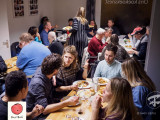
Sharing is caring, as the young folks say.
BuurtBuik is all about sharing food with your neighbors. We cook meals from food that would be wasted otherwise. Thereby, bringing people together around a free three course meal and build their social network. It impacts both environmental and social goals, thus, bridging the gap to a circular social economy. Come around a see it in action, we feed 500 people three course meals every week!
RESILIO - Amsterdam Blue Green Roofs
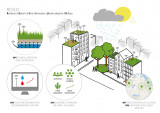
The EU-UIA funded the programme RESILIO, a project that aims to realize 10.000 square meters of blue-green roofs in four city districts in Amsterdam. The consortium of both public and private partners aims to build an interconnected network of smart roofs, in which sensors and state-of-the-art equipment enable micro-water management on rooftops. This contributes to urban climate adaption and resilience, and can potentially evolve into a scalable solution for water management on rooftops.
This project is co-financed by the European Regional Development Fund through the Urban Innovative Actions Initiative.
Amsterdam Biochar Initiative

Biochar is a soil amendment made typically from bio-mass through a process called pyrolysis with low-oxygen. By using a low-cost, easy-to-make biochar stove, communities can arrange to turn common waste products into biochar.
The vision behind this project is for healthy and resilient communities. This means that I prefer methods that promote local, DIY and community approach, so that it can quickly scale and adapt to different towns/cities.
Most importantly, carbon being the element behind Life has tremendous versatility. It can be used to filter water and then used as a soil amendment. Or it can be mixed to make better concrete composites for roads (asphalt) and concrete. It can improve manufacturing by making carbon fiber alloys.
Last but not least, it is done through a circular model of using waste such as wood sticks, bio-mass, paper, saw dust mills, anything with carbon, even plastics. The output heat can be captured for heating buildings and cooking stoves. The opportunities are endless.
Sizes of stove vary in function of available supply/demand dynamics. For more information, check the biochar-international.org or Ithaka International.
Thank you.
PS: Stockholm, Sweden has achieved this recently. If the Swedes can do it, we can learn from them and improve together!
http://www.nordregio.org/sustainable_cities/stockholm-biochar-project/
Some guidelines for background and context
https://www.biochar-international.org/wp-content/uploads/2018/04/IBI_Pyrolysis_Plant_Guidelines.pdf
nes.city
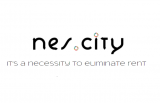
A global network of shared equity rent-to-own properties, offering liquid equity transferring to other properties globally. This will be as if the tenant is co-investing into a 'green REIT' fund along with CSR programs and NGOs, which we will use the crowdfund purchasing new properties, or reinvesting into sustainable urban development, and social entrepreneurs. The vision is to make a new type of bank persay, that offers an AirBnB+WeWork but connected with more community initiatives, like co-living spaces do, however we want to focus on spurring economic development and sustainability for low-medium income communities.
Looking for collaborators to work together and spread this vision.
Add me on LinkedIn and let's chat:
linkedin.com/in/alanjgreenspan
Stay up to date
Get notified about new updates, opportunities or events that match your interests.


